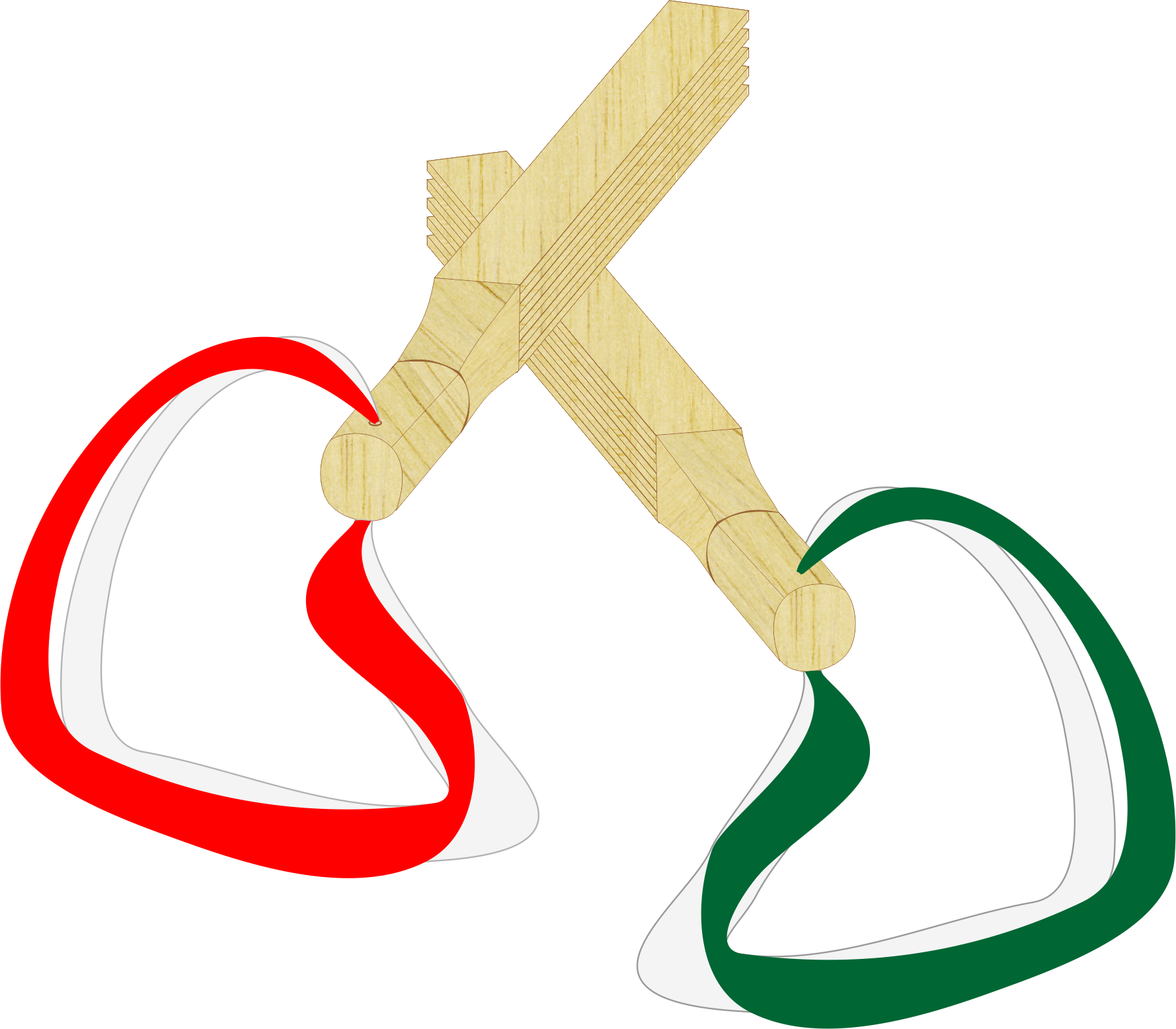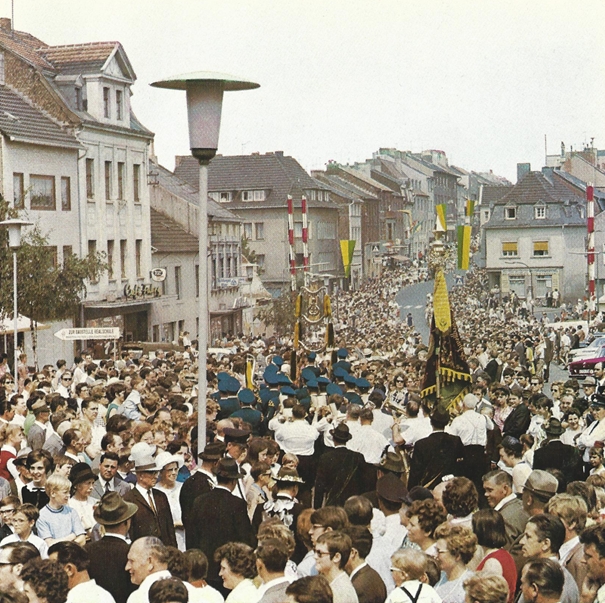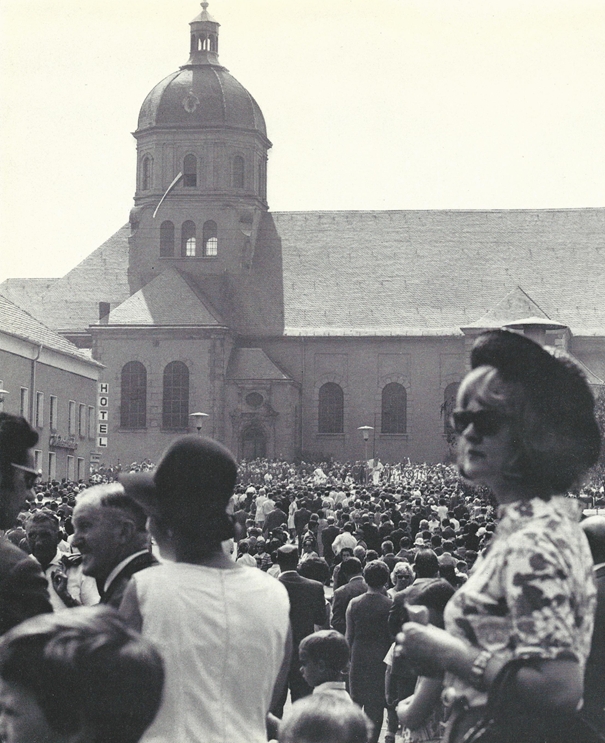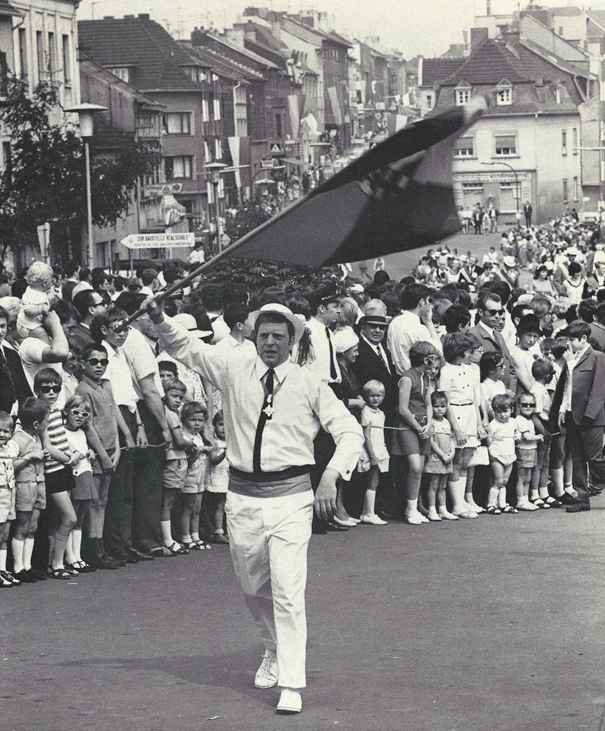 The text in the book “Würselen” dealing with the “Jungespiele” cited on the German page is impossible to translate. Therefore, the following essay on the Jungenspiele is only roughly based on this text but mostly written directly in English. This end up with a more readable page for a foreign visitor who did never heard about the Jungenspiele before:
The text in the book “Würselen” dealing with the “Jungespiele” cited on the German page is impossible to translate. Therefore, the following essay on the Jungenspiele is only roughly based on this text but mostly written directly in English. This end up with a more readable page for a foreign visitor who did never heard about the Jungenspiele before:
Although Würselen is generally known in the Aachen country as "Düvelstadt," it deserves another epithet, which indicates an old custom and thus a social event in Würselen. This event has been alive to this day. "Würselen - City of the Jungenspiele" stands on the special stamp used by the Post Office on the occasion of the 1100th anniversary of Würselen in 1970. City of the ‘Jungenspiele’?
Every Würselener knows exactly what that means. Nevertheless, a description of the agile life in clubs and societies we find in Würselen ought to begin with the custom of the ‘Mai-Singen’ and the ‘Jungenspiele’.
On the night to the first of May the unmarried young men (‘Maijungen’) meet to sing a certain old phrase in front of every house where a marriageable girl lives. This happens separately in groups following the old borders of the former villages and districts, the Würselen of today is made of. The purpose is to assign each girl to one of them for being May couple for the coming festival.
This night is hard for every young man in the group. What the original text in the book does not say a trolley is important to carry the liquid donations from the girls (see below) for their long way through the village.
Their leader, the ‘Maikönig’, does the assignment of the May couples with the following words:
„Höret, höret allen meinen Reden zu,
Was der Maikönig befehlen tut:
Er befieht von seinem Thron,
Dat die zwei sich beiene solle don.
Dat soll se - weä soll dat se?
Dat soll se met Nam genannt . . .“
There is no chance at all to put the lyrics into any English … the following is not more than a helpless trial to give you the clou.
“Listen, listen to all my words,
what the ‘Maikönig’ commands to do.
He commands down from his throne
That the very two are a couple for this May
The couple should be, who should they be?
They shall be called out by name …”
And then he will shout the name of the youngling and the name of the girl. The two are now a couple throughout the upcoming festival and events.

Impression of the Jungenspiel in Würselen
Source: "Würselen History Of A City"
The ‘Maijungen’ expect that the girl is so happy and grateful being chosen by the younglings that she proofs her gratitude with a generous donation. In the past, this donation consisted almost exclusively of a little basket with eggs. Today, there are more and more bottles in their place with a content warming in the cool night.
If the girl does not agree with the boy, the group goes away empty handed. There are different things the group can do in such a case … Mostly they have a drink and sing a song with unpleasant lyrics for the girl. By the way, they will have a drink anyway.
The most generous girl will be the ‘Maikönigin’, the May Queen, who is guided through the village on the arm of the May King and later on with a large entourage to the Mayball and the Jungenspiel.

Impression of the Jungenspiel in Würselen
Source: "Würselen History Of A City"
Hence, in former times, a girl could really ‘buy out’ the May King. Today, everything is settled beforehand, of course.
Three weeks after Pentecost, on the day of the great Würselener Kirmes (parish fair), the May Younglings then spring into action again – the Jungenspiele start.
The German word ‘Spiel’ means today a game or a match. In former times it meant ‘dancing’, ‘having fun together’. Hence, the Jungenspiel is the community of the Mai couples, parading and dancing in the street and marquee. There are as many Jungenspiele as districts or groups of ‘Maijungen’. The children of the district will accompany them during the parade, white trouses, white shirts and a slapstick are mandatory. Each Spiel has one or more musical bands playing marches while they parade through their district.
The ‘St. Sebastianus Schützen, on old Socienty of Riflemen’ found their yearly champion ‘Schützenkönig’ in a traditional contest. They fire with an old black-powder gun and lead ball ammunition at a wooden bird on top of pole until all pieces are down. The district where the Schützenkönig lives is called the ‘Königsspiel’, the King’s Spiel. Therefore, the Whit Monday, the day when this shooting takes place, is important
The Jungenspiele lasts a long weekend, from Friday evening until the night from Tuesday to Wednesday. All districts are not sharing the same weekend. Therefore, people can have a lot of fun in Würselen in May and June. Be aware, that the relevant streets are closed during the parade.
However, there is one big event that joins all Jungenspiele. On the third Sunday after Pentecost, they meet for a great parade in center of Würselen. It is rather spectacular to watch all the pairs (having about 10 Jungenspiele in Würselen with typical 20 May couples each). The girls traditional wear a long ceremonial dress, the boys in a suit with a sash in the colors of their district and a traditional straw hat in their hand.

Waving The Flag
Source: "Würselen History Of A City"
The young men and women of each neighborhood compete in having the longest parade, the best music and the most couples and the most young children accompanying the parade as ‘Pritschenjungen’.
The highlight is the ‘Fahnenschwenken’ ‘Flag Waving’ The flag wavers of each district compete in an artistic show in front of the church St. Sebastian. If the weather is fine, you can see a crowd of 20.000 people watching this spectacle, standing along the street and waving to the May couples passing-by parading back to their districts where they will dance the night away.
In the night from Tuesday to Wednesday when the Spiel is ‘buried’ you retire from the world for some time to recover from the Jungenspiel … and prepare for next year if you do not marry your girl of the last session.
Please observe the copyright of the city of Würselen.
For more information see here.

